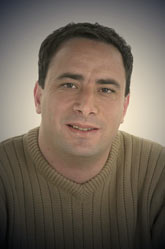
Handy Links
SLAC News Center
SLAC Today
- Subscribe
- Archives: Feb 2006-May 20, 2011
- Archives: May 23, 2011 and later
- Submit Feedback or Story Ideas
- About SLAC Today
SLAC News
Lab News
- Interactions
- Lightsources.org
- ILC NewsLine
- Int'l Science Grid This Week
- Fermilab Today
- Berkeley Lab News
- @brookhaven TODAY
- DOE Pulse
- CERN Courier
- DESY inForm
- US / LHC
SLAC Links
- Emergency
- Safety
- Policy Repository
- Site Entry Form

- Site Maps
- M & O Review
- Computing Status & Calendar
- SLAC Colloquium
- SLACspeak
- SLACspace
- SLAC Logo
- Café Menu
- Flea Market
- Web E-mail
- Marguerite Shuttle
- Discount Commuter Passes
-
Award Reporting Form
- SPIRES
- SciDoc
- Activity Groups
- Library
Stanford
Around the Bay
People: Mukhles Sowwan—Hope Through Science
Visiting Professor Mukhles Sowwan spent the past six years founding the Nanotechnology Research Laboratory at Al-Quds University in East Jerusalem. He has built the program and facilities there from the ground up, with the help of international funding and his determinedly hopeful outlook.
Sowwan's year-long sabbatical at Stanford and SLAC is sponsored partly by his home university and partly by a Fulbright Fellowship and hosted by Bruce Clemens at the university's Department of Materials Science and Engineering. Sowwan will be working in a new, state-of-the-art nanotechnology facility at Stanford, where he will create samples of metallic nanoparticles—very small particles with dimensions in the nano scale (1–100 nanometers), which have applications in fields ranging from computer hardware to medicine. He plans to test how the electrical and physical properties of the nanoparticles change with differences in their dimensions. Professor Herman Winick is hosting Sowwan at the Stanford Synchrotron Radiation Laboratory, SSRL, where Sowwan plans to use the X-ray diffraction beamlines on his completed samples.
Sowwan's sabbatical to California is one way that he is trying to keep his own research at the cutting edge of the field, in the face of major obstacles at home in East Jerusalem. In addition to ongoing violence and political upheaval in the area, funding for science is a major difficulty. Until recently, science research was not a priority of the Palestinian National Authority. Sowwan is leading the curve there with his belief that investment in science and technology can improve the local economy. His efforts to bring science, not just physics and nanotechnology, to the West Bank profiled in the New York Times in 2007.
"Education and science are the only way that Palestinians can reach a status where they can depend on themselves," he said. "I see no reason why Palestine can't learn from the Israeli experience and repeat their success with technology, nanotechnology or biotechnology."
Sowwan grew up in East Jerusalem, where many Palestinians live, but he attended Hebrew University in West Jerusalem for his doctoral work. He received a world-class education in physics, his life-long love, and was introduced to nanotechnology. However, his efforts to advance science in the West Bank were hindered by Israel's limits on imports and travel.
"I had the mobility to go to school in the West, but many people do not," said Sowwan. "People on the West Bank can't enter east Jerusalem. People from Gaza can't go to the West Bank. The mobility of Palestinian scientists is a problem." But that hasn't slowed Sowwan down.
When he opened his laboratory, Sowwan wrote articles in the local paper in an effort to bring science research and nanotechnology into the public eye. He has taken on a number of graduate students, and with the help of international funding, pays for their tuition and salaries. He has slowly contributed to building laboratory facilities at the university; all in order to not only make his lab functional, but competitive on an international scale. Sowwan also serves as a member of the Scientific Advisory Committee for SESAME (Synchrotron-light for Experimental Science and Applications in the Middle East), a research facility under construction in Jordan. The facility is intended to assist Middle Eastern countries and researchers like Sowwan to develop scientific programs such as nanotechnology, among many others.
While Sowwan's work in the Middle East has come a long way, the facilities in his lab, or anywhere in the West Bank, are nothing like those at SLAC and Stanford, and he says funding remains a serious limitation.
But Sowwan remains upbeat. He continuously repeats his hopes for the future and his dreams for his homeland. In his own laboratory, the students he can support are receiving a world-class education, collaborating with international scientists, publishing papers and contributing to conferences. He encourages his own students to travel outside the West Bank, as well, for their postdoctoral appointments, in order to enrich themselves and expand their knowledge. And then perhaps, like he did, to bring their expertise back home.
"If I went to another country and entered into the high tech industry, I could make ten times more than what I'm paid in salary at Al-Quds," he says. "But one thing that I always feel that people don't have in industry is the hope in the eyes of my students. They are doing this type of research that was not available to them before, and there is hope in their eyes for their future. This is worth, for me, millions."
—by Calla Cofield
SLAC Today, January 12, 2011
